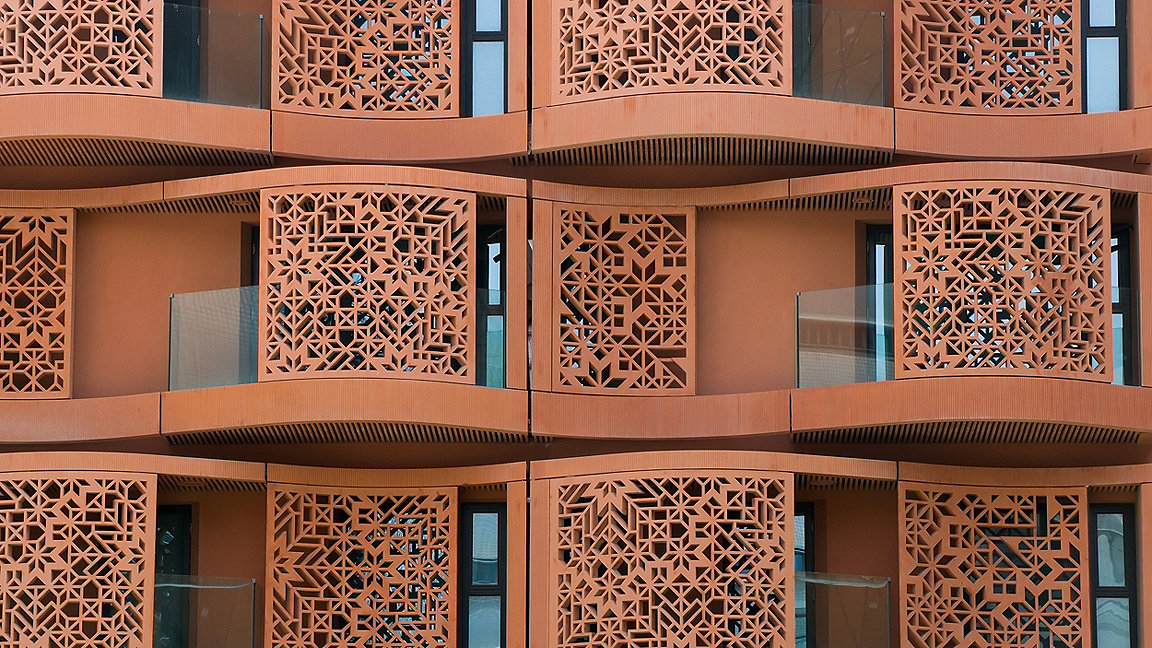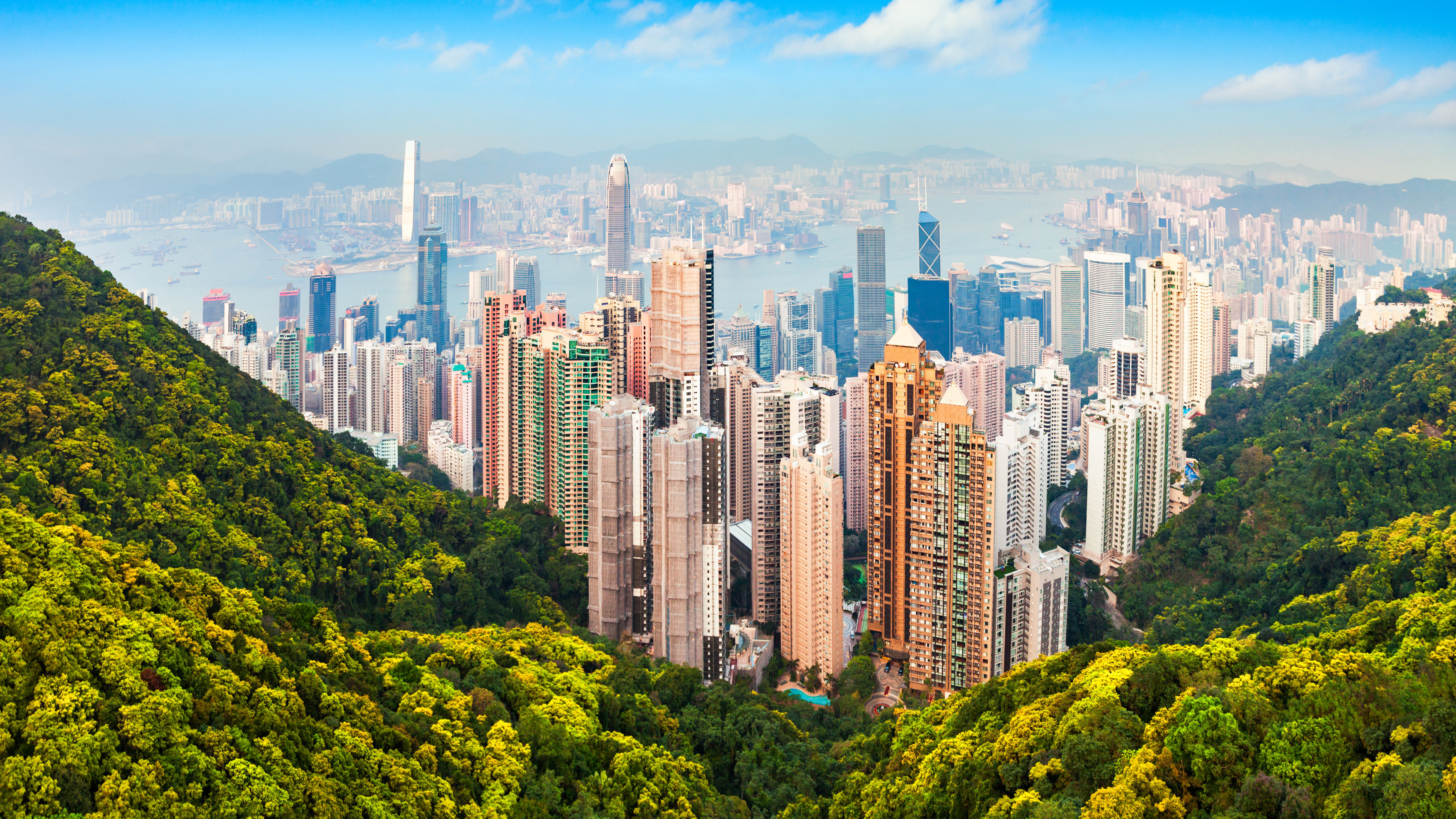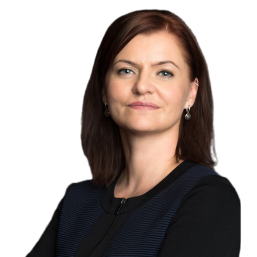
Eco-friendly building design in Masdar City, Abu Dhabi, UAE
Green financing in the Middle East is growing at an exponential rate, with sustainability-linked debt issuance in the region reaching an all-time high of $6.4bn in 2022.
Governments and financial institutions in the Middle East consider environmental, social and governance (ESG) metrics and sustainable development to be key criteria for investment. However, governments must develop more transparent frameworks and regulations to support the acceleration of private green financing in the real-estate sector.
The global ambition to mitigate climate change has increased demand for green investment opportunities, particularly in the real-estate market and built environment. Green financing has thus increased by a factor of more than 200 in the past decade, with global issuance of green bonds up from $2.3bn in 2012 to $511.5bn in 2021.
Leading investors such as BlackRock, Goldman Sachs and Blackstone have said that ESG considerations are going to be key to their investments in future. Demand for green financing and lending to improve buildings' ESG performance in real estate is high across the globe, but especially in the Middle East.
'Governments must develop more transparent frameworks and regulations to support the acceleration of private green financing in the real-estate sector'
'Demand for green financing and lending to improve buildings' ESG performance in real estate is high across the globe, but especially in the Middle East'
The growth in green finance in the region is being driven by several factors. Local governments understand the need to diversify into new, expanding pockets of future economic opportunity, such as those presented by sustainability and green initiatives. Likewise, investors in the region are seeking ways to diversify their portfolios into these areas. There is growing demand from clients, too, for ways to implement sustainable and green approaches across their physical assets, whether existing or planned.
For example, the Masdar Green real-estate investment trust is enabling development of sustainable assets by issuing green bonds to support the future expansion of Masdar City.
The Middle East could unlock $2tr in green economic growth across the Gulf Cooperation Council up to 2030. Moreover, research suggests that nearly all the key financing mechanisms and policy measures that promote and support climate-compatible development are being led by the United Arab Emirates (UAE).
States must support green finance growth
Although the private sector has increased its involvement in green financing in recent years, governments must overcome a number of key challenges to support more sustainable real estate. As well as creating incentives, they could start by clarifying regulations that at present inhibit the development of green financial instruments.
The lack of harmonised sustainable finance rules is clearly an obstacle to development in this regard, as is the absence of guiding principles at an international level such as global climate finance definitions. International standards in this area could accelerate progress and support local governments to facilitate green financing in the Middle East and North Africa (MENA) region.
Governments in the region must together support financial institutions as they create new markets for sustainable products and services, which include:
-
green deposits
-
green mortgages
-
green bonds and Shariah-compliant financial certificates, known as sukuk
-
green loans
-
green insurance to support possible future carbon-based financial and/or regulatory mechanisms.
At COP 26 in Glasgow last November, the UAE government's Sustainable Finance Working Group emphasised that, despite the unclear legislative context, work was under way on developing regulations relating to green finance in the country.
In this spirit, the Abu Dhabi Global Market issued a sustainable finance declaration, which envisages promoting and increasing the quality and depth of such finance in the Emirati capital to create a prosperous market as part of a global community of banks.
Banks take lead in sustainable real estate
Governments can work with private organisations to accelerate and promote green financing in the real-estate sector. There are several examples of private organisations leading the way.
-
In 2022, the UAE launched the first sustainable real-estate investment trust fund, which is being led by Masdar in partnership with Emirates National Bank of Dubai. This scheme aims to provide an opportunity to invest in a diverse portfolio of sustainable real-estate options, including existing properties in and future proposed properties within Masdar City, Abu Dhabi.
-
Aldar Properties has partnered with HSBC to launch a sustainability-linked loan, which will be the first of its kind in the Middle East. The loan consists of 300m dirham ($81.5m) over a five-year period, a facility that links interest margins to be paid by achieving sustainability targets with ESG initiatives covering energy and water intensity, waste recycling and worker welfare.
-
First Abu Dhabi Bank (FAB) was the earliest in the Middle East to commit to $10bn of loans and investments in sustainable projects over a ten-year period. FAB is one of the few financial institutions in the MENA region that issues green bonds, with a total of $587m in the Middle East alone.
-
A number of projects in Saudi Arabia are being supported by green finance from private investment organisations, including the development of the renewable energy pipeline, the Sudair solar power project and the construction of new hotels in the Red Sea region.
Furthermore, the international Standard Chartered Bank provides green financing in the Middle East, and has invested $40bn for sustainable project financing services, including:
-
$600m in green sukuk with MAF Sukuk Ltd
-
$2bn in revolving credit facilities with DP World, which was the first green loan in the Middle East
-
$561 million in financing with Shuaa Energy for a vast solar park in Dubai
-
a structured $600m sustainability-linked transition sukuk for Etihad Airways, which was the first of its kind in the region.
Real estate in the Middle East is in a transition that will see exponential growth in sustainable finance. With additional government support, sustainability will quickly become a permanent and significant fixture of financing in the region – a direction that will benefit the sector's entire value chain as well as its users.



